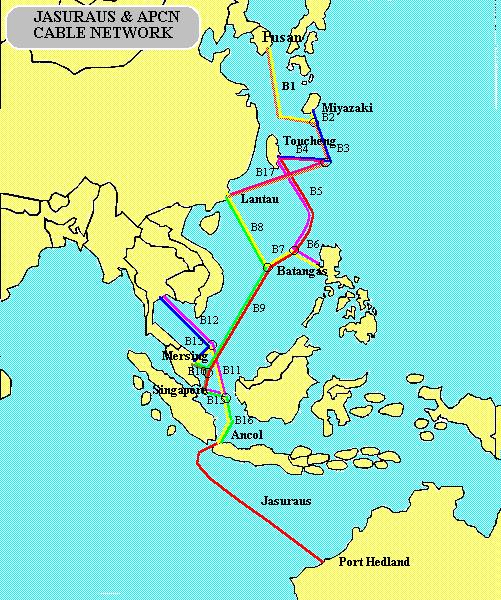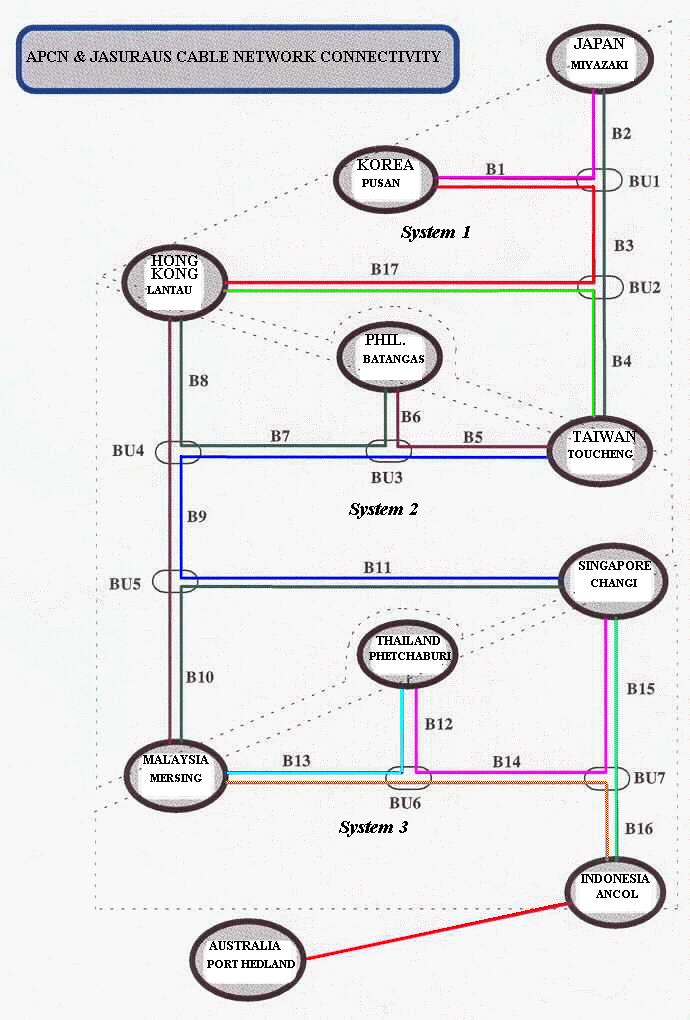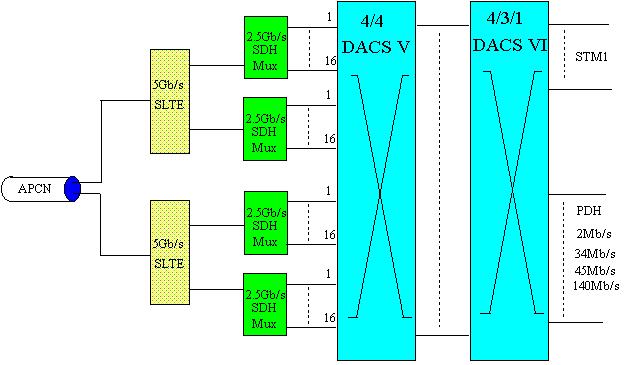
 |
|
|
The 12,000 km Asia Pacific Cable Network (APCN) is an optical fibre SDH submarine cable system which provides high-speed, high-capacity telecommunications links between Australia, Asia and beyond. This cable uses Optical Amplification Technology in its 153 submarine repeaters.
JASURAUS, linking Australia (Port Hedland) with Indonesia (Jakarta), connects Australia to APCN which, in turn, provides access to nine major Asian destinations, with onward connection to other destinations (such as the US and Europe) via
planned or existing submarine cable systems. (JASURAUS is also known as APCN/A - or the Australian Extension of APCN)
1. SYSTEM CONFIGURATION
APCN is a two fibre pair system operating at 5Gb/s per fibre pair. The network consists of 9 terminal countries, Japan, Korea, Taiwan, Hong Kong, Malaysia, Thailand, Philippines, Singapore and Indonesia. Each cable landing consists of two fibre pairs connecting a terminal station with two other stations, the exact routing being determined by fibre routing in the branching units.
Optical Amplifier technology is deployed in the submerged plant instead of traditional regenerative repeaters. The cable system is divided into 3 systems plus JASURAUS, the configuration is depicted in the following figure.
As can be seen in the above drawing, JASURAUS is a single fibre pair extension of APCN from Indonesia to Australia.
EQUIPMENT CONFIGURATION
At the cable station, a 5Gb/s signal is provided for each fibre pair. The 5Gb/s signals are terminated at the System Line Terminating Equipment (SLTE) and each is demultiplexed into two 2.5Gb/s STM-16 signals. Each 2.5Gb/s signal is further demultiplexed into 16 STM1 signals. The STM-1 signals are connected to the Lucent 4/4 (DACS V) which maps VC4ís to other cable stations or drops off local VC4ís to the 4/3/1 DACS VI. The primary role of the cable station DACS equipment is to provide for cable restoration.
The APCN is equipped with a network management system, the System Surveillance Equipment (SSE) and the DACS manager, the DACS Scan 2000. The SSE monitors the submersible plant and its associated terminal equipment and the DACS Scan 2000 monitors and control the DACS Vís.
AT&T DACS SCAN 2000
The DACS Scan is used to manage all the cable site 4/4 DACS V & 4/3/1 DACS VIís centrally from Hong Kong. The basic DACS Scan-2000 consists of a minicomputer as host, and a workstation as the operator terminal. Networking is achieved through data links to all cable station sites allowing control to be achieved together with local access by workstations located at all cable station sites.
Major Functions are:- POWER FEED
The system is designed for double end power feeding and switchable branching units which allow the power feed arrangements to be changed so that faulty branch cable sections can be isolated.



∑ Circuit Provision
∑ Network Map
∑ Alarm management
∑ Restoration via pre-planned restoration maps
∑ Performance monitoring
| Technical Details | |
| RFS Date | January 1997 |
| Capacity | 5.332 Gbit/s per fibre pair (2 X STM 16) |
| Total cable length | 12,083 km |
| Number of Fibre Pairs | 2 Pair |
| Manufacturer | System 1 & 3: KDD-SCS and AT&T-SSI System 2: Alcatel Submarine Networks |
| Repeater Design | Optical Amplification |
| Number of Repeaters | 153 |
| Mean Repeater Spacing | (a) max. 90 km (b) min. 74 km |
| Transmission Capacity | 2 x STM16 or 32 x 155.52 Mbit/s |
| System Design Life | 25 years |
| Maximum Depth | 6,300 m |
| Landing Points |
Pusan, Korea Miyazaki, Japan Toucheng, Taiwan Batangas, The Philippines South Lantau, Hong Kong Mersing, Malaysia Changi, Singapore Phetchaburi, Thailand Ancol, Jakarta, Indonesia |
Send mail to Ron Beckett with questions or comments about this web site.
Last Modified: 19-09-2000
© Telstra Corporation Limited 2000
ģ Registered Trademark of Telstra Corporation Limited.